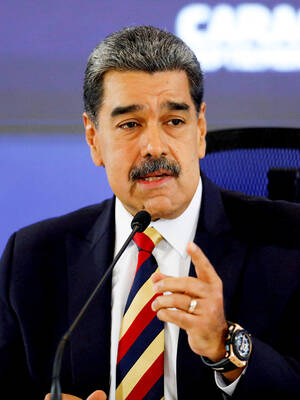China last month sent a senior official to symbolically hand over the keys to a nine-story twin tower to house Uganda’s president and prime minister, a gift from Beijing.
The white structures with a sloping roof cost China US$27 million to build. However — in a strategy that China is increasingly employing around Africa — Beijing did not just deliver the money and let Ugandan officials see the project through. It was built by Chinese workers in what aid watchdogs applaud as a model to help defeat the inefficiencies and cash-pocketing corruption associated with other systems of foreign aid delivery.
China has a growing economic footprint in Uganda and much of the rest of Africa, and some Ugandans complain of the rising number of Chinese arriving to set up shop. China’s strategic interest in this East African country has deepened at a time when Uganda hopes to become an oil producer.
However, the completion of projects like a modern hospital complex has softened China’s reputation, while Beijing’s efforts to produce turnkey projects are winning fans among Ugandans tired of seeing their officials ripping off foreign aid projects with impunity.
Instead of giving cash, the Chinese government prefers to pay Chinese companies to build roads and structures, bypassing local politicians, powerbrokers and construction crews, and to deliver them completed.
The China model is “more effective. It’s less prone to corruption,” said Sven Grimm, the executive director of the Center for Chinese Studies at Stellenbosch University in South Africa. He said the approach also bolsters China’s economy, because “Chinese enterprises ... go out and gain international experience.”
Experts say China’s model of donating buildings and roads might help it cut the risk of aid scandals like the one that rocked the US$22.6 billion Global Fund to Fight AIDS, Tuberculosis and Malaria over the past year.
The Geneva-based financier gets donations from wealthy donor nations and private sources like Bill Gates. However, donors recoiled after the fund’s internal watchdog documented more than US$50 million in losses because of corruption, other misuse and unauthorized spending, affecting much of Africa, including Uganda.
In February 2010, in the aftermath of scandals that shook the faith of donors in the government’s ability to cut wasteful spending and corruption, a World Bank official warned that corruption had become “endemic.” However, Western nations keep giving aid to Uganda, infuriating anti-corruption activists.
“If I have abused your money and you give me more, it’s like you are applauding me,” said Cissy Kagaba, who heads a watchdog called the Anti-Corruption Coalition of Uganda.
Transparency International ranks Uganda among the most corrupt nations, at 143 out of 182 countries, in its most recent survey. Public officials in high and low places are constantly looking for opportunities to steal or be bribed and the offerings of foreign governments and agencies have traditionally been easy to abuse.
US and European aid money, for example, frequently funds workshops at expensive hotels. Participants of the “capacity building” programs are given free travel to the sites along with per diems and accommodation.
“Capacity building ... is the easiest to steal because the only evidence is paper accountability,” said Augustine Ruzindana, Uganda’s former anti-corruption chief. “The people who pay also know what they are doing, and so it’s self-perpetuating. With the Chinese method it’s easier to show that something has been done. They do concrete things which can be seen by several generations.”
China’s aid is not always welcomed. Last month new headquarters paid for by China for the African Union were unveiled in Ethiopia. Rwandan President Paul Kagame called it “pathetic” that Africa accepted such a donation and asked whether Africa couldn’t afford to pay for such a building itself.
In Uganda, as in other African countries where it has strategic interests, China has polished its reputation with muscular projects which it then hands over as gifts. Prominent donations to Uganda include the headquarters of the ministry of foreign affairs and a sports stadium.
Even when the projects are tied to loans, such as in the planned construction of a four-lane expressway from the capital to Uganda’s international airport in nearby Entebbe, the Chinese insist on taking full charge. This has shut down avenues traditionally used by public officials to inflate costs while doing shoddy work, to get paid for work not done or to insist on bribes before endorsing certain projects, anti-corruption officials say.

VENEZUELAN ACTION: Marco Rubio said that previous US interdiction efforts have not stemmed the flow of illicit drugs into the US and that ‘blowing them up’ would US President Donald Trump on Wednesday justified a lethal military strike that his administration said was carried out a day earlier against a Venezuelan gang as a necessary effort by the US to send a message to Latin American cartels. Asked why the military did not instead interdict the vessel and capture those on board, Trump said that the operation would cause drug smugglers to think twice about trying to move drugs into the US. “There was massive amounts of drugs coming into our country to kill a lot of people and everybody fully understands that,” Trump said while hosting Polish President

China on Monday announced its first ever sanctions against an individual Japanese lawmaker, targeting China-born Hei Seki for “spreading fallacies” on issues such as Taiwan, Hong Kong and disputed islands, prompting a protest from Tokyo. Beijing has an ongoing spat with Tokyo over islands in the East China Sea claimed by both countries, and considers foreign criticism on sensitive political topics to be acts of interference. Seki, a naturalised Japanese citizen, “spread false information, colluded with Japanese anti-China forces, and wantonly attacked and smeared China”, foreign ministry spokesman Lin Jian told reporters on Monday. “For his own selfish interests, (Seki)

Japan yesterday heralded the coming-of-age of Japanese Prince Hisahito with an elaborate ceremony at the Imperial Palace, where a succession crisis is brewing. The nephew of Japanese Emperor Naruhito, Hisahito received a black silk-and-lacquer crown at the ceremony, which marks the beginning of his royal adult life. “Thank you very much for bestowing the crown today at the coming-of-age ceremony,” Hisahito said. “I will fulfill my duties, being aware of my responsibilities as an adult member of the imperial family.” Although the emperor has a daughter — Princess Aiko — the 23-year-old has been sidelined by the royal family’s male-only

A French couple kept Louise, a playful black panther, in an apartment in northern France, triggering panic when she was spotted roaming nearby rooftops. The pair were were handed suspended jail sentences on Thursday for illegally keeping a wild animal, despite protesting that they saw Louise as their baby. The ruling follows a September 2019 incident when the months-old feline was seen roaming a rooftop in Armentieres after slipping out of the couple’s window. Authorities captured the panther by sedating her with anesthetic darts after she entered a home. No injuries were reported during the animal’s time on the loose. The court in the